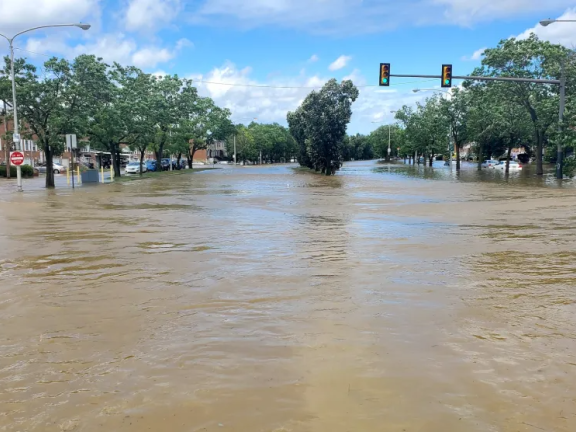
Background
The Greater Philadelphia region is currently confronting the consequences of climate change, and these consequences are expected to expand and intensify in the coming years. The consequences that pose the most severe risk of direct impacts are extreme precipitation events, extreme heat, and rising sea levels that will increase the elevations of the tidal Schuylkill and Delaware Rivers.
The region is expected to see an increase of up to 12 percent in average annual precipitation by 2050. On average, the number of days per year with temperatures exceeding 100 degrees could increase from a historical average of less than 1 to as many as 17 by the end of the century. And sea level in the region is expected to rise by up to 45 inches by the 2080s. These impacts will combine to produce a myriad of social, environmental, and public health consequences, including increased heat-related death and disease, increased costs for energy and insurance, and added stress to both built and natural infrastructure. These consequences will fall most heavily on communities and neighborhoods that already struggle with the legacy of decades of disinvestment and discrimination.
Thoughtful planning and effective implementation can help communities to reduce their vulnerability and enhance their ability to adapt to the impacts of climate change. There is broad agreement – in the research literature and in lived experience – that resilience is most achievable when communities are actively and authentically engaged in timely planning and decision making. Such participation helps support transparency, knowledge sharing, and trust building, and increases the legitimacy of decisions and decision-making processes. It can also build community capacity and coherence that is, itself, a critical component of community resilience.
Opportunity Overview
The Foundation seeks to support efforts to advance community-driven, place-based planning processes that will enhance the climate resilience of communities in Philadelphia, Chester, and Camden. We will not be funding plan implementation through this RFP – that opportunity will be provided in a future RFP.
We are requesting proposals for projects up to a maximum of two years in duration. We expect that the appropriate project term will depend on the specific context in which you are working, including the groundwork that may or may not already be in place for the work. After reviewing proposals, WPF will conduct site visits and gather additional information from a limited number of organizations.
Organizations that propose projects in partnership with other applicants will be considered on their individual merits. However, the Foundation recognizes that the work necessary to make significant progress on this objective will be complex, and the most competitive proposals are consequently likely to be those that include robust partnerships that leverage complementary strengths, resources, and expertise.
Furthermore, the Foundation recognizes that climate resilience plans can be produced using a variety of tactics or approaches. Proposals may request support for planning processes that address different types of climate impact vulnerability (e.g., heat, flooding, etc.) and/or that seek to increase different types of climate impact adaptability (e.g. improving built and natural infrastructure; expanding community knowledge; supporting community leadership). Applicants may request support for one or multiple components of the planning process (e.g. outreach and education, community engagement, technical assistance, etc.).
In describing the proposed work, all submitted proposals should, as applicable:
- define the community that will be served by the planning process and the expected impact, e.g. number of residents served,
- identify the specific climate vulnerabilities that the planning process seeks to address,
- describe the project deliverable that will be completed by the end of the grant term, and
- articulate how and when the proposed work will contribute to the production of an implementable plan.
All proposals that meet the criteria described on pages 7-8 are encouraged.
WPF has $1.5 million available to advance this objective at this time. The maximum amount that organizations may request is $300,000. The grant amount requested should be commensurate with the contribution that the project will make to the overall objective.
Full Request for Proposals (RFP) and Application
Download the full RFP packet for more information about this opportunity including eligibility, review criteria, learning and insights, budget, and link to an application template.
All applications must be submitted through the Grants Portal.
Webinar
An informational webinar was held on September 17, 2025: